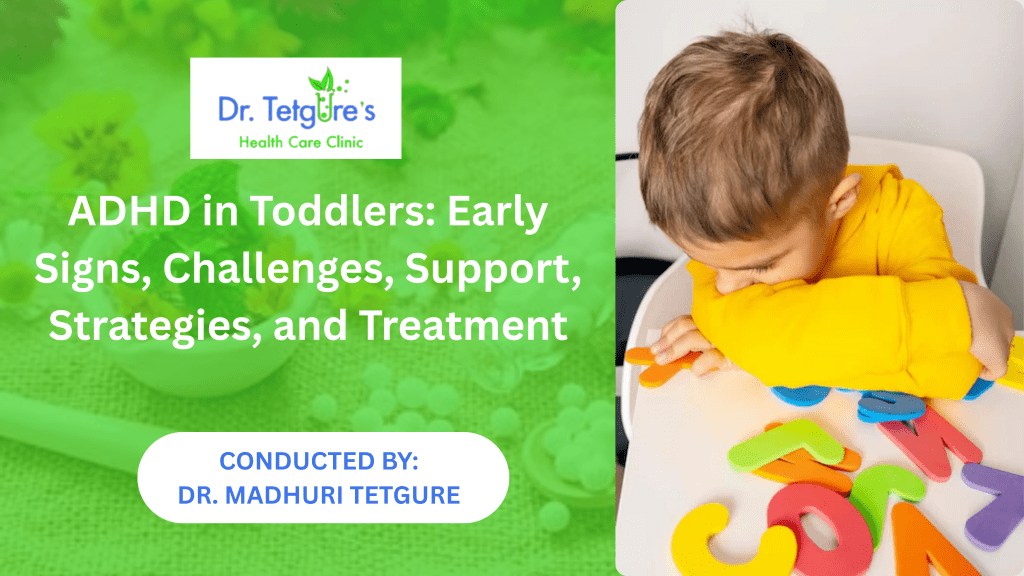
ADHD or Attention Deficit Hyperactivity Disorder is usually linked to school-aged children, but ADHD symptoms can be seen in toddlers as well. It is very important to recognize the presence of ADHD in toddlers because if they get early support, it can lead to effective management of their symptoms, better learning, and emotional development. A thorough understanding of the early signs, the challenges and the possible treatments can help parents make the right choices regarding their child’s health and happiness.
Early Signs of ADHD in Toddlers
Fortunately, the symptoms of ADHD in toddlers are not the same for all children, but some of the most common early signs are:
Movement that is constant and restlessness: Toddlers with ADHD usually appear to be incapable of staying in one position. They might run, jump, or even climb when it is not appropriate.
Very short attention span: Not being able to focus on toys or activities for more than a couple of minutes.
Impulsiveness: Doing things without thinking, taking things without asking and interrupting others very often.
Problems with sleep: Difficulties in going to sleep or having irregular sleep cycles.
Outbursts of emotions: Getting frustrated quickly, having tantrums or being unable to control their emotions.
Although these actions may be typical for a toddler’s development, if they are present in different locations (home, playgroup, daycare) all the time, they might indicate the need for a professional evaluation.
Challenges Faced by Toddlers with ADHD
Toddlers with ADHD can experience problems with more than just attention and focus; they may also have difficulties in regulating their emotions and interacting socially. Parents usually have a hard time dealing with daily routines, mealtimes and sleeping especially when children are unable to obey instructions, share toys, or play together nicely. These difficulties can cause tension in the parent-child relationship and for the caregivers and child as well, more so when the condition is not diagnosed.
How Parents Can Support Toddlers with ADHD
Early parental support is crucial for the proper development of toddlers with ADHD. Below are some practical suggestions:
Set up structured routines: Regularity gives toddlers a sense of security. Have their meals, playtime and bedtime at the same times every day.
Positive reinforcement: Instead of pointing out mistakes and punishing, reward and praise for good behavior.
Distractions should be limited: Set up an environment conducive to learning and activities where distractions are minimal.
Physical activity should be promoted: Taking them out for playing, doing kids’ yoga or dancing can be great for stimulating their energy positively.
Be patient: Realize that control over actions takes time and patient guidance.
Effective Strategies and Interventions
Toddlers usually receive non-medical interventions as the first line of treatment. Non-medical measures still play the major role in the management of ADHD, often accompanied by medication. Behavioral therapy and parent training programs can bring down hyperactivity and impulsiveness to a large extent. They teach parents to identify the triggers, communicate effectively, and using methods such as playing and structured discipline, positively reinforce the child.
In case ADHD impairs the child’s speaking or doing things with hands then speech therapy or occupational therapy can be suggested. To compensate for the child’s difficulties in communication or motor skills, the specialists working with infants and toddlers’ in early childhood education can help by offering short and stimulating activities together with individual attention.
Conclusion
Recognizing ADHD in toddlers early allows parents and caregivers to provide timely intervention. With regular routines, behavioral plans and professional guidance, children with ADHD can lead healthy, happy and fulfilling lives. If you observe steady hyperactivity, volatility or focus issues in your toddler. Consult an ADHD expert at Dr. Tetgure Healthcare for expert evaluation and help.
